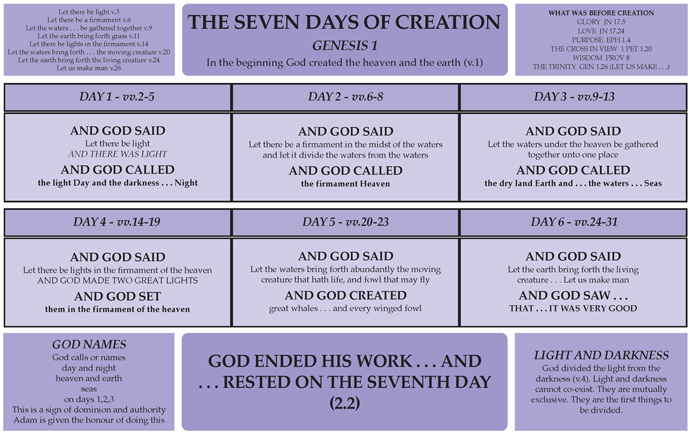
The creation account contained in Genesis 1 is a factual and accurate account of what took place in seven days when God created the heaven and the earth. The following should be noted.
THE PRE-EXISTENCE OF GOD
God is eternal
He is without beginning and without end, and He lives above and beyond time. The concept of eternity which can be understood by the human mind, and which is far short of reality, is of duration prolonged without ending, both backwards and forwards, as if it is duration throughout endless ages. Eternity, however, is greater than that. It transcends time, is outside of time, and is not subject to any of the characteristics of time.
God is uncreated
He always has been, always is, and always will be. With Him there is no beginning and with Him there will be no end. It is impossible for finite minds, created for and limited by time, to comprehend the fact of the eternity of God, but the Scriptures declare this truth eloquently. God was in the beginning (Gen 1.1; Jn 1.2) and is the Creator of all things. Thus nothing was created that He did not create, therefore He is uncreated, therefore He is eternal, therefore He is God.
But as He is uncreated He is also timeless. He is not subject to time and with Him there is no yesterday, today, or tomorrow; there is no past, present, or future
The PERSON of God
God is self-existent
There is no cause for the existence of God. All other beings have a cause for their existence, but not so the God who caused the creation of all things created.
Also, as self existent:
God is holy
In His holiness, He cannot sin. "For thus saith the high and lofty One that inhabiteth eternity, whose name is Holy" (Is 57.15). He is high in what He is Himself and He is the lofty One in what He is in relation to others.
God is immutable
God is not subject to change. This does not mean that He never changes in any way. He repents, He reveals Himself, He hides Himself, but His person, plan and purpose never change and all the seeming "changes" have always been in that purpose.
God is infinite
He is without limitations of any kind. With Him there are no restrictions and no one and no thing can place any restriction on Him.
God is Spirit
He is therefore not subject to the limitations of the body. Thus the Lord Jesus emphasised that they who worship God must do so "in spirit and in truth" (Jn 4.24). Worship must be in accord with His character.
God is omniscient
God has all knowledge. There is nothing that is beyond His understanding. There is nothing that yet has to be found out, and there is nothing that He does not know. He required no education, and knowledge did not come to Him gradually. He is the creator of knowledge and all true knowledge is only comprehended by others when He is placed first.
God is omnipotent
God is all-powerful. There is nothing that He cannot do. "Is any thing too hard for the Lord?", is the rhetorical question asked in Genesis 18.14. "Is there any thing too hard for me?", is how it is placed before Jeremiah (Jer 32.27).
God is omnipresent
God is not limited to one location. He is everywhere. This is how the Psalmist expresses this truth: "Whither shall I go from thy spirit? or whither shall I flee from thy presence? If I ascend up into heaven, thou art there: if I make my bed in hell, behold, thou art there" (Ps 139.7-8).
THE PRE-EMINENCE OF GOD
The work of creation was God’s work alone and therefore only God is responsible. As a result it is good, and seven times it is declared to be so (Gen 1.4,10,12,18,21,25,31). Note that when the work was complete it was "very good" (1.31). There is an excellence about the complete which is greater than each individual part.
THE PLAN OF GOD
It was a deliberate act of God’s purpose
It was creation not evolution; divinely given history and not received tradition; a purposed act and not causeless event; it bore the stamp of God’s acts and authority.
The giving of names is a sign of lordship and proprietorship. We see, for example, the Lord Jesus exercising that right when He gave Simon the additional name of Peter (Jn 1.42), and James and John the title Sons of Thunder (Mk 3.17). In Genesis 1 God calls the light, day; the darkness, night; the firmament, heaven; the dry land, earth; the waters, seas.
It had man as its crown
Note that his name was given to man before his creation. Man was also the only creature to be created as a result of the solemn counsel of the Godhead (v.26) and was made in the image and likeness of God. Image represents and presents to others. Likeness resembles and involves qualities corresponding to God. Man was:
Created in a unique way
Only man is recorded as being created as an individual (2.7), and only of man is it recorded that the Lord God formed man of the dust of the ground. "Formed" denotes great skill and care such as used by a potter. The impartation of life to man was carried out in a unique way when the Lord God "breathed into his nostrils the breath of life". Man is unique, directly formed by the hand of God and not the result of a process of evolution!
Able to understand divine communication
Of all that God said in this chapter it is only to man that God spoke. In other cases God spoke and what He purposed came into being, but after man was created God spoke unto them (these two words are used of no other creature), to him directly, and thus man was made to understand the word of God.
Given responsibility
Man is the only creature of whom it is said that he was given dominion. The one who had responsibility to rule had also moral responsibility to obey God.
Given a law to obey
He was told not to eat of the tree of the knowledge of good and evil. We do not find this until ch.2, but it reveals that man was given the ability to understand between right and wrong, between good and evil. Right was what God decreed, wrong was to act contrary to that. God did warn of the consequences of not obeying. It was enough that He had spoken.
It was orderly
3 marked it
7 marked it
There are seven Hebrew words in the first verse; seven times it is "good" (see above); seven days of twenty hours are recorded.
10 marked it
Ten times God spoke (1.3,6,9,11,14,20,24,26,28,29). This is, therefore, the first decalogue of Scripture.
It had blessing as its objective
Three blessings are associated with harmony with God (1.22,28; 2.3). God’s first act to man was to bless. His intention is for the good of man.
It taught man lessons
There is a lesson here about how work is to be performed. God could have created all things with one word in one day, but it was not His desire so to do. Work has to be carried out in an orderly way, in stages, with each stage marked by an end, and with each stage "good" before moving on to the next stage.
THE PURPOSE OF GOD
For Christ
Christ must have the pre-eminence. He is before all things and by Him all things consist (Col 1.17-18).
For God
Creation is for the pleasure of God (Rev 4.11); a world teeming with creatures whose life proclaims His glory. In the Sabbath rest the Lord would have enjoyed that creation but for the entrance of sin. That enjoyment awaits a coming day - the Day of God, the institution of which is spoken of by Peter (2 Pet 3.12).
For Man
Man was created to participate in the blessings of Divine life, for the love of God to find expression outside of the Godhead, and to allow mankind to love, serve, and enjoy God eternally. May we all bow before the One who has all under His control and acknowledge His greatness and our indebtedness to Him.









